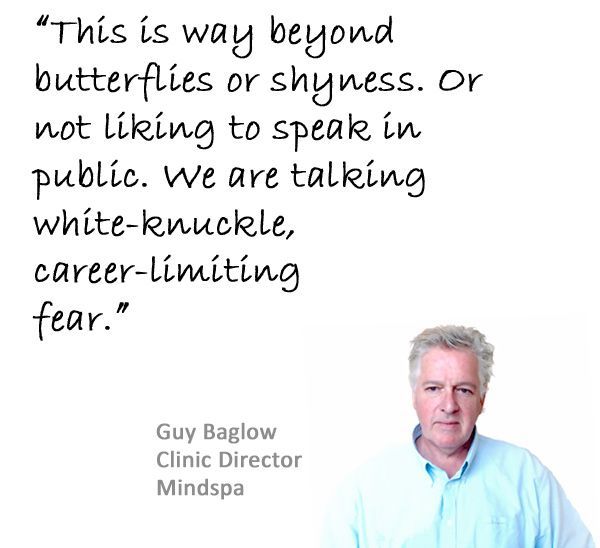What is glossophobia?
Glossophobia is a very common phobia involving an extreme, irrational fear of public speaking and being judged, embarrassed or humiliated when speaking in front of others. It triggers intense anxiety, dread, panic and avoidance of public speaking situations.
How do I know if I have glossophobia?
If you are experiencing some or all of these signs and symptoms of glossophobia (fear of public speaking) and they are impacting your life and career, it indicates a diagnosable case of glossophobia:
Excessive anxiety before speaking publicly, avoidance of events requiring public speaking (presentations, speeches, meetings, calls and introductions), attempts to manipulate situations to make them more tolerable, freezing or going blank whilst talking, severe physical symptoms like rapid heartbeat and breathing, changes in voice and focus, irrational negative thoughts about being judged, and obsessively ruminating afterwards about what happened.
How can I overcome my fear of public speaking?
Glossophobia is an irrational fear of public speaking where the conscious mind recognizes the situation is safe yet the unconscious mind triggers an automatic fear response. To overcome it, the negative patterns driving the irrational anxiety need to be deconditioned so they don’t trigger and the speaker stays calm and comfortable. This is achieved through specialized therapy.
Will public speaking courses help me overcome my fear of public speaking?
Public speaking courses often fail to address the core anxiety and fear, leaving presenters still terrified despite having or learning the skills. Because the real issue isn't the skills, but rather the crippling fear itself. Without the right treatment to resolve the underlying fear, the presentation skills remain unusable and ineffective.
Will tips for public speaking help me overcome my fear of public speaking?
Traditional public speaking tips like planning, using visuals, or making eye contact are ineffective for overcoming a genuine fear of public speaking. People with glossophobia have a lower bar - they simply want to get through the presentation, meeting or call without crippling anxiety. So the focus needs to be on addressing and eliminating the underlying fear itself. And that’s exactly what our program does.
Is glossophobia the same as stage fright?
Stage fright and glossophobia refer to the same condition - an excessive, irrational fear of public speaking or performing in front of an audience. While "stage fright" is a colloquial term often used for performers on stage, like actors and musicians, glossophobia is the clinical term describing this phobia characterized by fear, anxiety, and panic when speaking publicly or the complete avoidance of the feared situations.
Are glossophobia and shyness the same thing?
Glossophobia, the fear of public speaking, goes far beyond shyness or butterflies. It's a powerful, often incapacitating fear and anxiety that at its worst can trigger panic attacks. With glossophobia we are talking about white-knuckle hardcore fear around speaking in front of others, not just mild anxiety.
What is the Spotlight Effect?
The Spotlight Effect refers to the tendency of individuals to overestimate the extent to which others are paying attention to their appearance, conduct, and actions. This cognitive bias results in an exaggerated feeling of being observed and judged by others, leading to heightened self-consciousness and intense anxiety, particularly in situations such as public speaking, where individuals may feel that all eyes are on them.
Read more: The Spotlight Effect and Public Speaking Anxiety
Can CBT help me overcome glossophobia?
People who fear public speaking (glossophobia) already know that the situations aren't actually dangerous, but another part of their mind, the emotional part responsible for survival, kicks in and tells them to be frightened. So not only is the fear driven by a different part of the mind, but the “cognitive” aspect of Cognitive Behavioral Therapy (CBT) that tries to change their thinking is not very helpful because it’s not a great insight to show them that their phobia doesn’t make sense. Also, with glossophobia their anxiety is usually so intense that gradually facing their fear – the exposure therapy which is a key part of CBT - can feel overwhelming and reinforce the fear.
How common is the fear of public speaking?
Glossophobia (fear of public speaking) is one of the most prevalent phobias, with around 75% experiencing some anxiety when speaking publicly. However, a significant 20-30% suffer from diagnosable glossophobia characterized by intense dread, panic, and avoidance. This implies that in a meeting of just 10 people, 2-3 individuals are likely experiencing high levels of public speaking anxiety.
Sources:
National Institute of Mental Health. (n.d.). Specific Phobia. https://www.nimh.nih.gov/health/topics/anxiety-disorders/index.shtml#part_145354
Gallup: American’s Top Fears
https://news.gallup.com/poll/1891/snakes-top-list-americans-fears.aspx
MAKE THE RIGHT CALL TODAY
0800 302 9452
OPEN TODAY 8AM - 9PM
Speak to us in confidence about your phobia and find out how we can help you
MINDSPA
1 Harley Street
London, W1G 9QD
While the building is being redeveloped we are delivering our programs exclusively online
* The Mindspa Phobia Clinic is the UK's leading private phobia clinic where every day we eliminate phobias of all kinds - even extreme and long-standing ones - using the latest tools in psychotherapy. However, as with all psychological interventions, there is no guarantee of a permanent cure in all cases. The testimonials on this page and website are not a guarantee of success.
ABOUT US
The Mindspa Phobia Clinic is the UK's leading private phobia clinic where every day we eliminate phobias of all kinds - even extreme and long-standing ones - using the latest tools in psychotherapy.
Copyright © 2018 MindSpa Ltd
* OUTCOMES
We are a specialist phobia clinic and experts in treating phobias. However, as with all psychological interventions, there is no guarantee of a permanent cure in all cases. The testimonials on this page and website are not a guarantee of success.
FIND US
MINDSPA
1 Harley StreetLondon W1G 9QD
While the building is being redeveloped we are delivering our programs exclusively online
SPEAK TO US
0800 302 9452
LINES OPEN TODAY 8am - 9pm
A consultation is free, anonymous and without obligation. A quick call could change your life.
MINDSPA ® is a registered trademark
ABOUT US
The Mindspa Phobia Clinic is the UK's leading private phobia clinic where every day we eliminate phobias of all kinds - even extreme and long-standing ones - using the latest tools in psychotherapy.
Copyright © 2004 - 2018 MindSpa Limited
* OUTCOMES
We are a specialist phobia clinic and experts in treating phobias. However, as with all psychological interventions, there is no guarantee of a permanent cure in all cases. The testimonials on this page and website are not a guarantee of success.
FIND US
MINDSPA
1 Harley StreetLondon W1G 9QD
While the building is being redeveloped we are delivering our programs exclusively online
SPEAK TO US
0800 302 9452
LINES OPEN TODAY 8am - 9pm
A consultation is free, anonymous and without obligation. A quick call could change your life.
MINDSPA ® is a registered trademark









